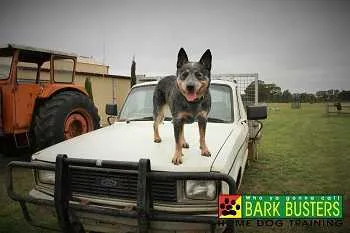Does Your Dog Get Car Sick?

Does your dog get car sick? Did you know that 1 in 5 dogs suffer from car or motion sickness? Dog motion sickness is real and can happen even on short jaunts. Know that most carsickness episodes in dogs are brought about by stress and not the motion itself. Your final destination may be what is making your dog worried or sick.
Signs of Car Sickness
- Drooling
- Vomiting
- Dry heaving
- Excessive lip licking
- Excessive panting
- Shaking
- Inactivity
What's the Cause of Car Sickness?
1. If your dog is a pup, ear structures used for balance may not be fully developed yet. Many puppies outgrow motion sickness.
2. Some older dogs associate a car ride with something traumatic - maybe they were abandoned at a shelter or remember being car sick as a pup. Consider avoiding car rides for a couple of weeks.
How to Help
Try to make the car ride as comfortable as possible for your dog. Many dogs seem to love going for car rides because they get to spend more time with you and love to hang their head out the window. In fact, your dog may hang their head out the window to prevent nausea.
1. Conditional training. Start by getting your dog used to the car with the engine turned off. Then spend time in the car and create a positive association. Try feeding them in the car, give them their favorite bone in the car or brush them (if this relaxes them). Do not start going places in the car until they are calm and relaxed from these visits. Then progress from sitting in the car, to sitting in the car with the ignition turned on to taking short trips around the block or to their favorite pet park.
2. Seat belt. For your protection and your dog's, use a doggy seat belt that allows them to face forward while traveling rather than looking out the side windows.
3. Travel crate. Some dogs get overwhelmed by all the visual stimuli passing by. Either use a doggie shade or place your dog in a crate, so your dog will not get thrown about should you get in an accident or stop suddenly. In the event your dog becomes ill, it will be a place to contain the vomit.
4. Air bags. If your dog rides in the front seat, understand that an air bag detonating could be a potential hazard to your dog, similar to small children. Additionally, in the case of an accident, your dog may go through the front windshield.
5. Food. Make sure your dog has an empty stomach before the ride. Avoid feeding your dog approximately 3 - 6 hours before a car trip. Provide plenty of food and water when you reach your destination.
6. Stop frequently. Some dogs can handle long car rides whereas others can't. A good rule of thumb is if your dog gets car sick, stop every hour or two to give them a chance to have some bathroom time.
7. Windows. Lower your car windows a few inches to balance the pressure inside the car with the pressure outside the car. Also be sure to keep the car cool and well ventilated as a hot and stuffy car can cause your dog to become ill.
8. Toys. Buy special toys that your dog enjoys and only give them access to them in the car.
9. Medications. Talk to your veterinarian about possible anti-nausea drugs should you exhaust all other options. Some vets will prescribe Dramamine (Dimenhydrinate), which is also used by people who have motion sickness or an all-natural dog calmer.
Be sure to consult with your veterinarian before purchasing any over-the-counter treatment for dog motion sickness so the appropriate dosage is given and should there be any adverse reactions.
Recent Articles
- Back to School Guide: Helping Your Dog Adjust to the New Routine
- How To Keep Your Dog Cool in the Summer Heat
- Keep Your Dog Safe This Summer: Bark Busters’ Essential Tips
- Christmas Dog Safety Tips: Keep Your Dog Safe & Happy This Festive Season
- Dog Training for Snake Safety: Essential Tips for Australian Pet Owners
- Dog Aggression Training & Tips
- Leash Training - How to Stop your Dog from Pulling on Walks
- Halloween Safety Tips for Dog Owners
- Understanding and Training Dogs with Separation Anxiety
- Why Is My Dog Barking So Much? Understanding Excessive Barking and How To Help
